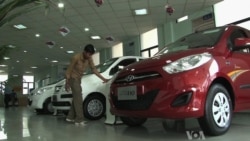GURGAON, HARANYA, INDIA —
In India, car sales are expected to fall for the first time in nearly a decade. India's slowing economy is hurting an auto industry that was once a top choice for global companies looking to expand.
New Delhi resident Rajesh Kumar could not think of a better time to replace his 10-year old Hyundai Santro.
"The price is right, the sales people are also very good. And I am buying a car this month because it’s the [Hindu] religious festival of Navatri," he said.
For those in the market for a new car in India, this could not be a better time, as dealers are offering discounts to get people in the door.
Sales in the world’s second fastest growing automotive market are expected to post their first annual decline since 2003.
The Society of Indian Automobile Manufacturers says the industry will miss all growth targets this year, noting that the sale of passenger cars was down 12 percent in January compared to the same period last year.
Sharad Mehra owns four auto dealerships in and around New Delhi, including this Hyundai showroom in Gurgaon. He says the stagnant market has his employees working harder for a sale.
"Earlier, what used to happen is we used to sit in the showrooms and wait for customers to come in, walk in - we used to try to convert that. But now, they [sales people] are all trying to go out, go and reach the customer. The customer gives a call, we try to go out to him," he said.
Rajiv Kumar, with India’s Center for Policy Research, says the steep fall in car sales reflects the frustration and despondency of those most affected by India’s slumping economy.
He says people are finding it harder to make aspirational purchases, including upgrading from owning a motorcycle to a car.
"As long as your car sales were growing, it represented the growth of that middle class and its aspirations and the fact that it could meet those aspirations," he said. "Now it’s not happening," he said.
Analysts say the economy’s effect on the auto industry is far-reaching. Major foreign automakers, like Ford, Suzuki, and Hyundai, have invested billions to build up operations in India and are now having to reassess their growth models.
Domestic manufacturers of auto parts are looking outside India for business, and steel companies are also feeling the pinch.
With interest rates at more than 12 percent, dealers and customers like Rajesh Kumar say the government can take steps to help bring sales back up.
"The government keeps increasing the interest rate, if they reduce it a little bit, then the public will benefit and more people will buy cars," he said.
While automakers wait for urban sales to recover, many are looking to take advantage of what many see as India’s untapped rural sector.
New Delhi resident Rajesh Kumar could not think of a better time to replace his 10-year old Hyundai Santro.
"The price is right, the sales people are also very good. And I am buying a car this month because it’s the [Hindu] religious festival of Navatri," he said.
For those in the market for a new car in India, this could not be a better time, as dealers are offering discounts to get people in the door.
Sales in the world’s second fastest growing automotive market are expected to post their first annual decline since 2003.
The Society of Indian Automobile Manufacturers says the industry will miss all growth targets this year, noting that the sale of passenger cars was down 12 percent in January compared to the same period last year.
Sharad Mehra owns four auto dealerships in and around New Delhi, including this Hyundai showroom in Gurgaon. He says the stagnant market has his employees working harder for a sale.
"Earlier, what used to happen is we used to sit in the showrooms and wait for customers to come in, walk in - we used to try to convert that. But now, they [sales people] are all trying to go out, go and reach the customer. The customer gives a call, we try to go out to him," he said.
Rajiv Kumar, with India’s Center for Policy Research, says the steep fall in car sales reflects the frustration and despondency of those most affected by India’s slumping economy.
He says people are finding it harder to make aspirational purchases, including upgrading from owning a motorcycle to a car.
"As long as your car sales were growing, it represented the growth of that middle class and its aspirations and the fact that it could meet those aspirations," he said. "Now it’s not happening," he said.
Analysts say the economy’s effect on the auto industry is far-reaching. Major foreign automakers, like Ford, Suzuki, and Hyundai, have invested billions to build up operations in India and are now having to reassess their growth models.
Domestic manufacturers of auto parts are looking outside India for business, and steel companies are also feeling the pinch.
With interest rates at more than 12 percent, dealers and customers like Rajesh Kumar say the government can take steps to help bring sales back up.
"The government keeps increasing the interest rate, if they reduce it a little bit, then the public will benefit and more people will buy cars," he said.
While automakers wait for urban sales to recover, many are looking to take advantage of what many see as India’s untapped rural sector.





